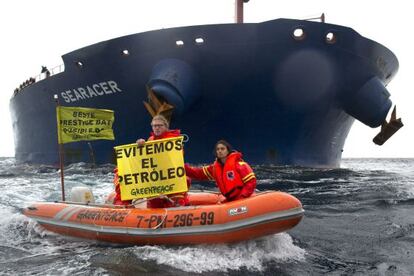Another Prestige disaster could happen, warns Greenpeace
A lack of political, legal and economic liability is a major factor, says NGO

A decade on from the Prestige oil spill of November 2002, the greatest environmental disaster the Spanish peninsula has ever seen, Greenpeace has warned that a similar catastrophe could happen again in Spain.
A lack of political, legal and economic liability; too much tolerance of floating "scrap piles" transporting dangerous cargoes across the oceans; and unreinforced maritime safety were all factors that mean "another Prestige is possible," the environmental organization said.
Greenpeace launched its warning last week in the port of Bilbao, with a protest against an oil tanker belonging to a business similar to that of the Prestige.
The organization also issued an extensive report outlining how much remains to be done in order to avoid further spills like the one that battered 1,600 kilometers of the Spanish and French coasts 10 years ago.
"Our best ally is not forgetting what happened," said Greenpeace Spain director Mario Rodríguez, stressing the importance of once again laying out the multiple reasons why a disaster on the same enormous scale as the Prestige catastrophe could happen again. "Its root causes remain," he said. Chief among those is the fact that no one has accepted responsibility for what happened.
To highlight this, activists from the group in Bilbao unfurled banners in front of the Searacer oil tanker, which, like the Prestige, has a Liberian owner, a Greek operator and shipping certificates issued by the American Bureau of Shipping classification society. It also sails under a flag of convenience - that of Malta (the Prestige sailed under a Bahamas flag) - and its insurance company is from Bermuda.
The aim was to point the finger at one of the lingering sore spots of the Prestige disaster: the near impossibility of pinning responsibility on the international business networks behind many oil tankers sailing around the European Union today.
Responsibility is the big issue surrounding the judicial hearing relating to the disaster at the Provincial High Court of A Coruña after 10 years of investigation: how will it ascertain responsibility for damages that the Public Prosecutor's Office sets at 4.442 billion euros when only two elderly seamen from the Prestige and the also-retired former director-general of the Merchant Navy are in the dock?
"A bonsai trial, limited, with a lot of empty seats," is how the writer Manuel Rivas, a member of citizens platform Nunca Máis, describes it.
For Greenpeace, the fact that no one responsible for the political management of the disaster higher up than the former Merchant Navy director general is on trial "demonstrates that personal and political interests are being prioritized above social and environmental ones."
It also reinforces the authorities' conviction that "everything was done properly," said Rivas.
Another fundamental issue still to be resolved despite being one of the main reasons for the accident is that of the old single-hulled oil tankers, which can no longer drop anchor in European Union ports. However, they have not yet been prohibited and continue to sail in EU waters.
According to Greenpeace, there remain "enormous deficiencies in legislation and in the liabilities system in maritime transport," emphasizing that profound changes in maritime safety and clear and concise protocols are needed to protect against and prevent accidents.
Tu suscripción se está usando en otro dispositivo
¿Quieres añadir otro usuario a tu suscripción?
Si continúas leyendo en este dispositivo, no se podrá leer en el otro.
FlechaTu suscripción se está usando en otro dispositivo y solo puedes acceder a EL PAÍS desde un dispositivo a la vez.
Si quieres compartir tu cuenta, cambia tu suscripción a la modalidad Premium, así podrás añadir otro usuario. Cada uno accederá con su propia cuenta de email, lo que os permitirá personalizar vuestra experiencia en EL PAÍS.
¿Tienes una suscripción de empresa? Accede aquí para contratar más cuentas.
En el caso de no saber quién está usando tu cuenta, te recomendamos cambiar tu contraseña aquí.
Si decides continuar compartiendo tu cuenta, este mensaje se mostrará en tu dispositivo y en el de la otra persona que está usando tu cuenta de forma indefinida, afectando a tu experiencia de lectura. Puedes consultar aquí los términos y condiciones de la suscripción digital.








































